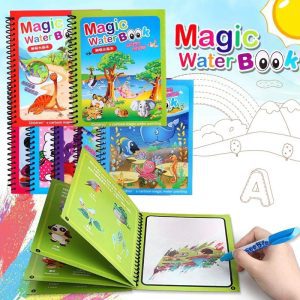We all know that children love to play. It’s how they explore the world and make experiences. They learn what is acceptable behavior and what isn’t. They learn how to deal with conflicts and how to control their emotions. And ultimately, through play, they learn how wonderful and fun life can be. In this article, we take a look at different types of games, playstyles and what and how children learn through play.
What children learn through play
Most people think of play as a time for children to have fun and let off some steam. But play is actually a crucial part of a child’s development. Through play, children learn important skills like problem-solving, cooperation, and communication. They also develop imagination, creativity, and self-confidence. In short, play is essential for healthy child development. research has shown that children who engage in regular play are more likely to do well in school and to have successful careers as adults. So if you want to give your child a head start in life, make sure to encourage plenty of playtime.

Of course, not all play is created equal. The best kinds of play are those that are imaginative, active, and social. So the next time your child is clamoring to go outside and play with friends, don’t worry that they’re not learning anything. In fact, they’re probably learning a lot more than you think.
Different types of games
Every child is born a natural explorer. From the time they are infants, they are constantly learning about the world around them through play. As they grow older, they begin to engage in more complex forms of play, such as make-believe and games with rules. Each type of play serves an important purpose in helping children learn and develop new skills. For example, pretend play helps children practice language and social skills, while cooperative games provide an opportunity to learn about teamwork and turn-taking. Games can also be used to teach children about numbers, shapes, and colors. But perhaps most importantly, through play, children learn how to have fun and be creative. So no matter what type of game your child is playing, know that they are gaining valuable skills that will help them throughout their life. Here are some great ideas to make playtime fun and productive:
• Building blocks: Help your child stack blocks or Legos to create towers, houses, or other structures. This activity helps develop fine motor skills and spatial awareness.
• Simon Says: This classic game is a great way to help your child learn about following instructions. It’s also a lot of fun!
• Hide-and-Seek: This game promotes active outdoor play while also teaching children about hiding and seeking skills, how to use the environment and how to follow directions.
• Musical Chairs: This game is a great way to teach children about cooperation and turn-taking. It’s also a lot of fun.
• Dress-Up: Children love pretending to be someone else! Encourage your child to try on different hats, clothes, and accessories. This activity helps children develop creative thinking and self-expression.
• Drawing: Provide your child with paper and crayons and let them loose! Drawing is a great way for children to express their thoughts and feelings. It also helps develop fine motor skills.
• Word games: Word games like Scrabble, Boggle, and Bananagrams are a great way to help children learn about letters, sounds, and vocabulary. They’re also lots of fun for the whole family.
• Math games: Games like Candyland, Chutes and Ladders, and War can be used to teach children about numbers, counting, and simple addition and subtraction.
• Storytelling: Encourage your child to make up stories or retell familiar tales. This activity helps develop imagination and language skills.
• Puppet show: Put on a puppet show for your child’s favorite stuffed animals or dolls. This activity is great for promoting creative thinking and self-expression.
Playstyles and their importance
When it comes to playing, there is no one-size-fits-all approach. Every child is unique and will therefore engage in different types of play that suit their individual personality and interests. However, all forms of play are important for children’s development. Here are some of the different play styles and the benefits they offer:
Active play is great for physical development and helps children to burn off excess energy. It also promotes social skills as children learn to cooperate and take turns.
Creative play allows children to express themselves and explore their imagination. It can also help them to develop problem-solving skills as they figure out how to use various materials to create their desired outcome.
Destructive play may not sound like it has any benefits, but it actually helps children to understand the consequences of their actions and develop self-control. It also teaches them how to stand up for themselves and assert their boundaries.
Social play is important for developing social skills such as communication, cooperation, and turn-taking. It also helps children to understand various social roles and how to interact with others.
Fantasy play allows children to explore different aspects of their personality. It also helps them to understand the difference between reality and make-believe. They need to adapt to different roles and think about what they would do in various situations.
Games with rules help children to understand the consequences of their actions and develop self-control. They also promote social skills as children learn to cooperate and take turns.
Unoccupied play is often seen as unproductive, but it’s actually important for children to have time to just explore and experiment without any specific goals in mind. This type of play helps children to develop their imagination and creativity.
Solitary play is important for allowing children to have time to themselves. It also helps them to develop a sense of self-sufficiency and independence.
Parallel play is when children play side-by-side but don’t interact with each other. This type of play is important for helping children to understand the concept of sharing and take turns.
Cooperative play is when children work together to achieve a common goal. This type of play promotes social skills, communication, and turn-taking.
Associative play is when children play together but don’t have a specific goal in mind. This type of play helps children to develop social skills and learn how to interact with others.
Onlooker play is when children watch other children playing but don’t join in. This type of play is important for helping children to understand social situations and learn about different types of play.
Competitive play is when children play against each other to see who can win. Children learn about winning and losing, important lessons in life. They learn how their behavior, their decisions and emotions can influence the outcome in their favor or not.
As you can see, there are many different types of play and all of them offer important benefits for children’s development. It’s important to encourage your child to engage in a variety of play activities to help them grow and learn in all areas. And, of course, have fun! That’s what playtime is all about.
The benefits of playtime
Most people think of playtime as something for kids, but the truth is that playtime is important for people of all ages.
Babies and toddlers learn best through play, and it’s a great way for them to explore the world around them. As kids get older, playtime can help them develop important social skills, and it’s also a great way to burn off energy. Even teens and adults can benefit from taking some time to play. It’s a great way to relieve stress, and it can also help you bond with your kids or grandkids.
And don’t forget about the benefits of family playtime. Spending some quality time together playing games or engaging in other activities can help create lasting memories and strengthen family bonds. So next time you’re feeling stressed or overwhelmed, take some time to play. It just might be exactly what you need.
How to make the most out of playtime
Parents and caregivers play an important role in their child’s development. Not only do they provide basic needs like food and shelter, but they also help to foster their child’s imagination and creativity. One of the best ways to do this is through playtime.

By providing opportunities for pretend play, singing songs, and telling stories, parents can help their children explore the world around them. In addition, playful activities can also help to develop important skills like problem-solving and communication. Of course, it’s not always easy to find the time or energy for playtime. However, even a few minutes of quality playtime can make a big difference in a child’s life. Here are a few tips:
Encourage open-ended play. Open-ended play is when children use their imaginations to create their own games and stories. This kind of play helps children develop critical thinking skills and learn to solve problems. So instead of giving your child a specific toy to play with, try offering them a variety of objects they can use in different ways. For example, blocks can be used to build towers or houses, or they can be sorted by color or shape.
Make time for outdoor play. Outdoor play is important for children’s physical development and mental well-being. Getting fresh air and exercise helps to improve concentration and focus, and it also reduces stress levels. If possible, try to set aside some time each day for outdoor play. Even something as simple as playing catch in the backyard can make a big difference.
Be a playful parent. One of the best ways to encourage your child to play is to model good behavior yourself. Be a playful parent by making time for family playtime, telling jokes, and being open to trying new things. Not only will you bond with your child, but you’ll also show them that playtime is important.
What are your favorite ways to play?
Do you have any tips for making the most out of playtime? We’d love to hear from you in the comments below.





































